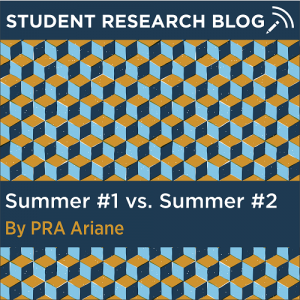By Ariane Garrett, OUR Peer Research Ambassador
 My freshman year I received a UConn IDEA grant to complete an independent research project over the summer. My sophomore year, I received a SURF award for the next steps in my research. Although I worked in the same lab both summers, lived on campus, and had more or less the same routine, the two experiences couldn’t have been more different from each other. What changed? I did!
My freshman year I received a UConn IDEA grant to complete an independent research project over the summer. My sophomore year, I received a SURF award for the next steps in my research. Although I worked in the same lab both summers, lived on campus, and had more or less the same routine, the two experiences couldn’t have been more different from each other. What changed? I did!
As the summer after my freshman year approached, my excitement about being awarded an IDEA grant began to wear away and the fear kicked in. I hadn’t spent much time working in the lab during the school year, and I was filled with questions and concerns about what working full time would look like. Do people eat lunch together? Who should I ask questions? What time should I show up to work? What will happen if I’m late? Can I take days off? Looking back, my life would have been much simpler if I had just asked my mentor all of these questions directly before I began working. Instead, I opted for a “figure it out as I go along” strategy that worked in the end but also wasted A LOT of my mental energy. For example, instead of just asking a question, I would spend 30 minutes debating whether asking it would make me sound incompetent. This summer, I already understood the lab etiquette. I was free to go to work and focus completely on my daily goals, unencumbered by internal woes about the workings of the lab. I was more productive and happier knowing exactly what was expected of me.
Going into this summer I had already developed many of the lab skills needed to complete my project. However, when I started working after my freshman year, I had no idea how to do anything. From the most basic tasks (like screwing something into a breadboard), to more complex skills (like creating a design in Solidworks), I was completely lost. On top of all that, I had no idea where anything in the lab was, and probably 75% of my time was spent looking for particular screws, scissors, or tape that I needed. I can clearly recall my first day working in the lab, when my mentor made a crude sketch of an optical system and suggested that I work on designing it. I looked at the piece of paper and thought, “He just designed it himself! What am I supposed to do?” I had no understanding of the design process, and the many steps needed to take an idea from conceptual to concrete. In contrast, when I began working this past summer I was equipped with all the skills I needed to work productively right off the bat.
Finally, I experienced a lot of personal growth between the first and second summer of research. The weekend before I began working during the first summer, my dad dropped me off at my studio apartment in the Oaks on the Square and left me to face the prospect of caring for myself for the first time in my life. I had to buy groceries, make dinner, and show up to work on time each day. None of my friends were living on campus over the summer, and I lacked the support system I had built during the year. I found myself enjoying my research more and more, but feeling lonely and anxious each night when I went home. If I could go back in time, I would have prioritized my social life more and reached out for support when I was feeling lonely. This summer, I learned from my mistakes and was more emotionally prepared to live on my own. I had friends on campus, knew how to feed myself, and planned fun activities for the weekends. I was much happier, and that translated into a greater motivation to work on my project and improved my overall productivity.
Over the past two summers of research, I’ve learned the value of sticking with something through all of the ups and downs. My first summer of research wasn’t perfect, but if I had given up then, I would never have had such a productive and fun experience this past summer. Working in a lab often requires a steep learning curve, and it takes time to get to the good stuff. With that in mind, learn from my mistakes: Establish what is expected of you before you start working, reach out for help if you are having trouble adjusting to campus life, and don’t be discouraged when you can’t find that one screwdriver you need!
Ariane Garrett is a junior double majoring in biomedical engineering and Spanish. Click here to learn more about Ariane.